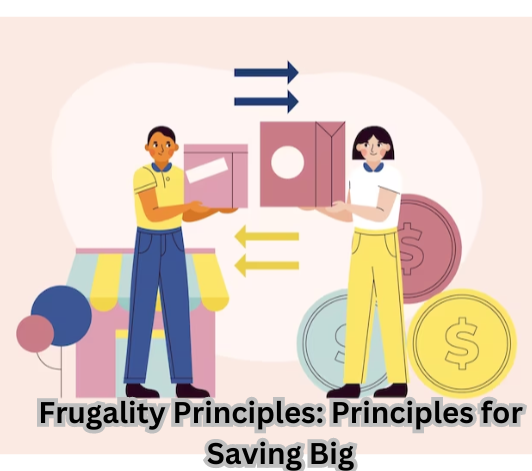Frugality Principles: Living from paycheck to paycheck can feel like you’re always struggling. You may feel stuck in a rut because your dream of being financially free may seem far away. That being said, what if there was a way to get rich and reach your goals? Now comes the idea of economy.
Being frugal doesn’t mean going without things or living badly
Frugality Principles Is about knowing where your money goes and finding ways to enjoy life without spending too much money. Following these rules, You can save money, pay off more debt, and invest in a better future.

But how do you begin?
Frugality Principles This blog goes over the ten most important rules of being cheap and gives tips on using them daily.
Plan how much you’re going to spend.
Frugality Principles: Make a budget to get control of your money. Please keep track of your income and costs to find places to save money and put it toward your financial goals. This process can be made easier with budgeting apps like Mint or YNAB.
Put needs ahead of wants:
Frugality Principles Know the difference between needs that you have to survive and be healthy and wants that are just wanted. Put your money toward things you need, like food, housing, and transportation. It’s okay to give in to your wants occasionally, but saving for the future is more important than buying things you don’t need. Set a “cooling-off” time before buying something that isn’t needed. This will help you think things through and stop you from spending money without thinking.
Adopt simplicity:
Frugality Principles: Avoid unnecessary things in your life and adopt minimalism. Instead of focusing on things, you should focus on events. This makes room in your mind and body, which makes you happier and less tempted to buy things you don’t need. Take it easy in one room at a time, like your closet or kitchen. Donate or sell things you don’t need to make extra money.
Cook more at home.
Frugality Principles For many people, you were eating out costs a lot of money. You can save a lot of money by cooking at home. You decide what goes into the meals and how much to eat so they are healthy and cheaper. Make a shopping list and a plan for your meals for the week to avoid buying things you don’t need.
Do things that don’t cost money
Frugality Principles Fun and relaxation don’t have to cost money. Check out your area’s parks, libraries, museums, and neighborhood events. Enjoy nature by climbing, biking, or just hanging out outside. Keep up with free things to do near you by following local social media groups or event lists.
DIY It: Frugality Principles
Frugality Principles: Instead of asking others to do things for you, learn how to do them yourself. This can help you save money on fixes, home improvement jobs, and spa services. Thanks to online tools and lessons, learning new things is easier than ever. Start with easy employment and work your way up to more difficult ones.
Give yourself a reason to save more: Frugality Principles
Frugality Principles: Make savings goals and keep track of your progress. This saves you and ensures you stay on track to reach your cash goals. Take part in tasks like “no-spend weeks” to save more money and learn better ways to spend it. Setting up automatic payments from your bank account to your savings account is a great way to save money.
Don’t get into debt.
Frugality Principles Debt can quickly become a big problem for your finances. If you already have debt, pay it off soon, and don’t use credit cards for daily purchases. Now you have more money to save and put away for the future. By consolidating or reducing your debt, you could lower your interest rates and make it easier to pay off your debts.
Put money into your future.
Frugality Principles Once you have some saved, put it somewhere it will grow over time. This makes you rich and helps you reach your money goals. You could invest in stocks, bonds, investment funds, or real estate. Talk to a professional if you’re unsure how to spend your money.

Celebrate Your Successes: Frugality Principles
Frugality Principles Tell yourself how proud you are of your frugal progress, and give yourself a prize. This keeps you going and tells you your hard work will pay off. Give yourself a small treat for making your money goals.
Remember that following the principles of frugality is a trip, not a goal. The benefits are infinite, but it takes time and work. You can become financially free, build a bright future, and live a happy, fulfilling life by being aware of your spending and making smart choices about your money.
FAQ: Frugality Principles
Frugality Principles Living with purpose and ability is what frugality is all about. It means being aware of how much you spend, putting your wants first, and finding ways to live well without going bankrupt. Being frugal doesn’t mean going without things or living badly; it means making smart decisions and getting the most for your money.
What is the frugality leadership principle about?
Economy leadership is about being responsible with your resources and getting more done with less. It tells leaders to be creative, clever, and independent, even when dealing with problems. This concept stresses that limits can help people be creative and develop new ideas.
How can I be frugal and save?
Here are some key strategies to embrace frugality and save money:
- Create a budget and track your expenses: This helps you identify areas for improvement and ensures you’re making conscious spending decisions.
- Prioritize needs over wants: Distinguish between essential needs and desires. Focus your spending on necessities and avoid impulse purchases.
- Embrace minimalism: Declutter your life and focus on experiences rather than material possessions. Consider selling or donating unused items.
- Cook more at home: Eating out is expensive. Prepare meals at home to save money and ensure healthier eating habits.
- Enjoy free activities: Discover free entertainment options like parks, libraries, museums, and community events.
- DIY projects: Learn to do things yourself for repairs, home improvement, and personal care. This saves money and builds valuable skills.
- Set savings goals: Clearly define your financial goals and track your progress to stay motivated—Automate savings transfers for consistent growth.
- Avoid debt: Prioritize paying off existing debt and avoid relying on credit cards for everyday purchases.
- Invest in your future: Invest your savings for long-term growth through stocks, bonds, mutual funds, or other options. Seek professional advice if needed.
- Celebrate your successes: Recognize and reward yourself for reaching your financial goals. This keeps you motivated and encourages continued progress.
What are the key characteristics of frugality?
- Resourcefulness: Finding creative ways to achieve goals with limited resources.
- Self-sufficiency: Relying on oneself and avoiding unnecessary dependence on others.
- Discipline: Resisting impulse purchases and sticking to your budget.
- Planning: Thinking ahead and preparing for future needs.
- Prioritization: Identifying what truly matters and focusing spending accordingly.
- Value-consciousness: Seeking good value for money and avoiding unnecessary expenses.

